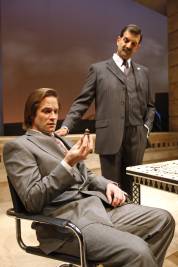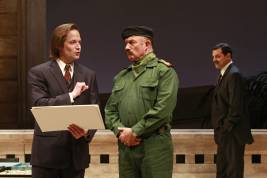
Middle East Meets West in Howard Korder’s thought-provoking culture clash dramatic comedy In A Garden, now playing to considerable acclaim at South Coast Repertory.
As topical as today’s CNN Headline News, In A Garden follows an Arab vs. American Odd Couple over a period of fifteen years, beginning with their first meeting in 1989.
The American is Andrew Hackett (Matt Letscher), a still “promising” U.S. architect once celebrated in a coffee table book about under-40 architectural prodigies. Though Andrew is rapidly approaching forty at the play’s outset, virtually all the important buildings which he has designed remain unconstructed.
The Middle Easterner is Fawaz Othman (Mark Harelik), the chain-smoking Minister of Culture of Aqaat, a fictional country standing in for Iraq. Though Fawaz has invited Andrew to Aqaat to discuss a project he hopes to see realized, the Aqaati seems more inclined to talk about movies like Dead Poets’ Society and Die Hard than the building for which Andrew has brought along his preliminary sketches. In their first of many conversations over the passing years, Fawaz reminisces about his university studies in the U.S and the American he once dated, a Malibu girl who has gone out and developed muscles in the years since.
It takes forever for All American “Time Is Money” Andrew simply to figure out exactly what kind of construction Fawaz is proposing that he build on his property. Will it be a summer house? A gazebo? “Before our grand adventure can begin, I need to know what we’re talking about,” he explains to his host, but about the only answer Andrew can get out of Fawaz is that is that he wants it built in a garden facing a famous mosque—that and Fawaz’s hope that the finished product will bring back memories of the lemon tree-lined dragonfly-filled garden of his childhood. Fawaz, on the other hand, is alternately amused by and disdainful of Andrew’s Yankee directness in doing business. Fawaz considers himself Andrew’s patron, telling him that “without me, you are unfinished.” Andrew, on the other hand, sees Fawaz as a client, nothing more, nothing less.
At first, Fawaz is hardly encouraging about Andrew’s sketches. The first batch prompts him to respond, “This will not do. It is lazy, hasty work.” The second design doesn’t fare much better, because, the Aqaati explains, what he is after is something that will “surprise me,” and what he sees in front of him is no surprise at all.
Still, despite his frustrations, Andrew keeps coming back for more, year after year, wishing and hoping and thinking and praying and planning and dreaming that Fawaz will finally okay his design and that construction can begin. After all, Fawaz has made Andrew a promise: “You are my architect. I will build you.”
Will Andrew be able to navigate the seas of cross cultural misunderstandings? Will he eventually figure out just what makes Aqaatis tick and how to do business with them? Will his American optimism remain firm, or will it turn to cynicism?
These are questions that Korder may (or may not) answer in In A Garden, but whether he does or does not is irrelevant to one’s enjoyment of his play. What he has written is a fascinating examination of the culture gulf that separates America from its Middle Eastern allies and adversaries. Andrew’s inability to disentangle himself from the morass that is his professional-personal relationship with Fawaz mirrors this country’s involvement in Iraq, the end of which seems as ephemeral as Andrew’s dreams of actually seeing Fawaz’s summer house/gazebo built.
A current online discussion thread asks the question, “Can a white person write a play about Iran?” Substitute the more general Middle East for Iran, and the answer in Korder’s case is an unqualified yes. Though one might assume that an American playwright would stack the deck in the U.S.’s favor, Korder treats both sides with respect. Believing that “Time Is Money,” Andrew wants to talk shop and get specific from the get-go. Fawaz, on the other hand, wants to build a relationship with Andrew before they get down to brass tacks. Though we may find ourselves siding with Andrew, both sides have a point, and both points are made equally well by their proponents.
Director David Warren helms In A Garden with sensitivity and assurance, never allowing either character to turn into a caricature, eliciting rich and multi-layered performances from his two leads.
Letscher has never been less than excellent in the numerous roles I’ve seen him play, whether comedic or dramatic, and his skill at both genres serves him well here, especially as Andrew’s frustrations reach the boiling point. This is some of Letscher’s best work ever. Though Harelik’s accent struck me a tad more Russian than Arabic (and I’ve taught hundreds of Middle Easterners over the past three decades), in all other respects his performance is impeccable. Suave and erudite yet very much the foreigner, Harelik’s Fawaz combines warmth and impenetrability, and when an unexplained malady affects his character late in the play, Harelik’s performance ascends to a whole new level.
A pair of supporting actors also do excellent work. As “Brother” Najid, the Saddam Hussein stand-in who rules Aqaat with an iron hand (and numerous look-alike decoys), Jarion Monroe not only amuses but plays his scenes entirely in phonetically-learned Arabic to creditable effect. (Kudos to Harelik too for his own ability to learn lines in a language he does not speak.) In the play’s coda, Phillip Vaden does memorable work as an American Army officer who finds himself as out of place in 2004 Aqaat as Andrew has been these past fifteen years.
Korder leaves many questions unanswered at final curtain, and wisely so. If answers were easy to achieve, America might not find itself seven years and counting in a war we seem as unable to extricate ourselves from as Andrew is in his dealings with Fawaz.
Christopher Barreca has designed an imposing set which evokes our images of the Middle East, with its mosaic-covered wooden table and ultra modern pair of steel-and-leather chairs providing an apt metaphor for the clash between old and new in the Arab world. Lap Chi Chu’s gorgeous lighting design changes with the seasons and times of day, particularly in the way the designer lights the hazy sky which provides a backdrop for Barreca’s set. Sound designer Vincent Olivieri’s original music situates the audience smack dab in Arabia, ups the tension, and provides dramatic punctuation at the end of each scene. David Kay Mickelsen effectively costumes each character in a new outfit for each of the play’s chapters, with Andrew’s trendy ensembles reflecting both his personality and the passage of time, and Fawaz’s nearly identical ones telling us much about the person wearing them. Mickelsen has also designed traditional Arab women’s wear, veils and all, for the two female stage hands who execute scene changes like servants in Fawaz’s home. Dramaturg John Glore, production manager Joshua Marchesi, and stage manager Jennifer Ellen Butler complete the production team.
In less skilled hands, In A Garden could have proven overly esoteric or just plain boring. It is neither. Too funny to be considered a drama, yet too intelligent and thought-provoking to quite deserve the designation of comedy, In A Garden is that rarity—a play that entertains and elucidates in equal measure. You’ll be talking about this one on the ride home from the theater.
South Coast Repertory, 655 Town Center Drive, Costa Mesa.
www.scr.org
–Steven Stanley
March 16, 2010
Photos: Henry DiRocco/SCR






 Since 2007, Steven Stanley's StageSceneLA.com has spotlighted the best in Southern California theater via reviews, interviews, and its annual StageSceneLA Scenies.
Since 2007, Steven Stanley's StageSceneLA.com has spotlighted the best in Southern California theater via reviews, interviews, and its annual StageSceneLA Scenies.







 COPYRIGHT 2024 STEVEN STANLEY :: DESIGN BY
COPYRIGHT 2024 STEVEN STANLEY :: DESIGN BY